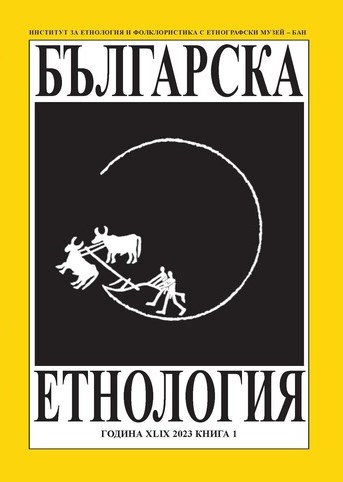
We kindly inform you that, as long as the subject affiliation of our 300.000+ articles is in progress, you might get unsufficient or no results on your third level or second level search. In this case, please broaden your search criteria.

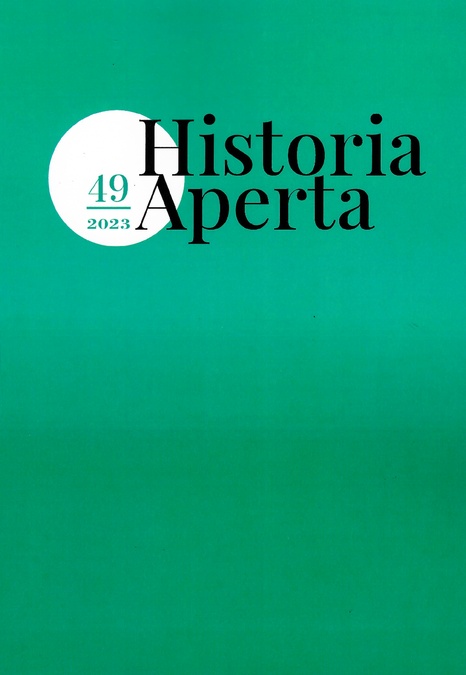
For the study of gender relations and the role of women in the Czechoslovak socialist society, it is very beneficial to pay attention to the forms of celebrations of International Women's Day (IWD). The national holiday dedicated to women as a social group was the best plafform for articulating the regime's strategies concerning women and revealing the contradictions in which Czechoslovak state socialism perceived women. Moreover, on the occassion of IWD, not only the prototype of the female ideal set by the Communist Party came to the surface. Direct or incautious hints, the problems of ordinary women, the shortcomings of socialist society, the true nature of the declared "equality", gender stereotypes and the whole complex of contemporary discourse about women were revealed inside the partiarchal system. The primary sources for this article are periodicals (especially the Rudé právo newspaper and Vlasta magazine), which are understood as means of "authoritative discourse". This authoritative discourse mediated, among other things, through the regime media is a central factor in the stabilization and legalization of the system. Such a discourse is also a set of statements and phenomena maintaining a consensus between the rules and the ruled. Other items of value for the study are the archival materials stored in the Nation Archive, period sociological surveys and stenographic records from the proceedings of the National Assembly.
More...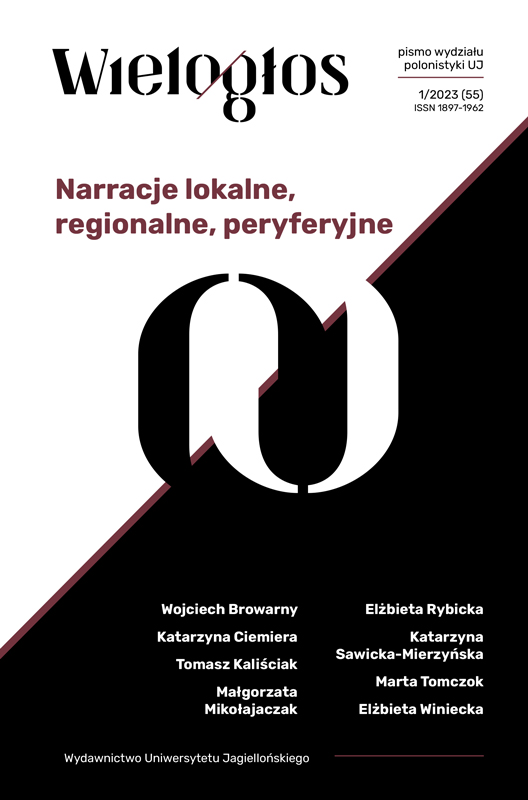
The article focuses on the relationship between gothicism and regionalism in the literature of Lower Silesia. The author poses a question about the role of the imaginarium of horror in shaping the psychotopography of the region, in which real, spectral and affective topographies converge. An important context is the peripheralization of the region after the political transformation, which resulted in economic regression of Lower Silesia. Gothic regionalism is therefore interpreted as a reaction to social, economic and political processes taking place on a local and global scale, but perceived from a peripheral point of view. As a descriptive term, however, it allows to recognize several aspects: the key role of center-periphery relations, local-global interactions, the influence of late capitalism, the return of repressed events as the uncanny, the horror of everyday life and the exclusion of what exceeds the internal normativity of regional communities. Works of selected authors were analysed, e.g. Joanna Bator, Olga Tokarczuk, Henryk Waniek, Jakub Bielawski, Maciej Bobula.
More...
The article consists of two parts. The first contains a summary and an interpretation of the project “New regionalism in literary studies,” initiated in 2012 by Małgorzata Mikołajczak and Elżbieta Rybicka, joined by researchers from, among others, Białystok, Olsztyn, Katowice and Wrocław. The author looks at both external reception, analyzing reviews of the publications that are the aftermath of the New Regionalist conferences, and internal one, i.e. self-diagnoses formulated by its participants. One of the conclusions is the postulate to strengthen interregional comparative studies, which can be helped by the use of tools developed in the field of translation studies, especially in its cultural variety. The second part is devoted to the Belarusian writer from Podlasie, Sokrat Janowicz, who treated translation as a way to overcome the particular determinants of his own work and Belarusian culture.
More...
The article proposes the use of a new concept of coal city, which allows describing regions of hard coal mining and post-mining regions by taking into account both their geology as well as their mining and economic culture. Węglopolis (Coal City) is a perspective on literature and art, particularly useful in attempts to assess the past of coal regions and design their future. The author shows the correlation of coalpolises both with the available naming tradition (Górnośląsko-Zagłębiowska Metropolia, polis, megalopolis), as well as with research on the Carbocene, a specified variant of the Anthropocene, in which the role of hard coal in creating and destroying societies, the natural environment and culture is taken into account.
More...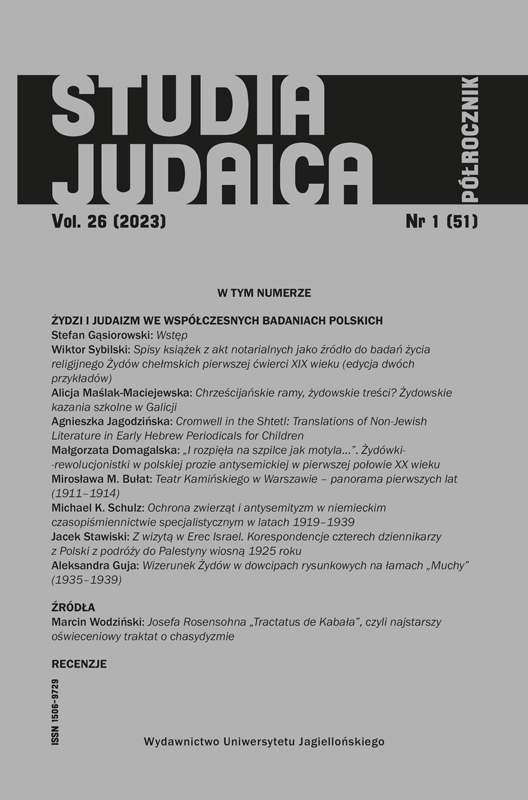
The Image of Jews in Cartoons from the “Mucha” Magazine (1935–1939) The article discusses the visual images of Jews presented in cartoons from the satirical journal Mucha between 1935 and 1939. Mucha was a major satirical magazine in Poland and the only one published during the whole interwar period. The aim of the study is to analyze the visual discourse about Jews emerging from cartoons using digital tools (MAXQDA). Both quantitative and qualitative methods were applied to check which elements of the picture create a specific type of stereotype. The findings suggest that the overall image of Jews is contradictory, albeit dominated by categories related to money and trade. There are also images that do not fit into the dominant antisemitic discourse.
More...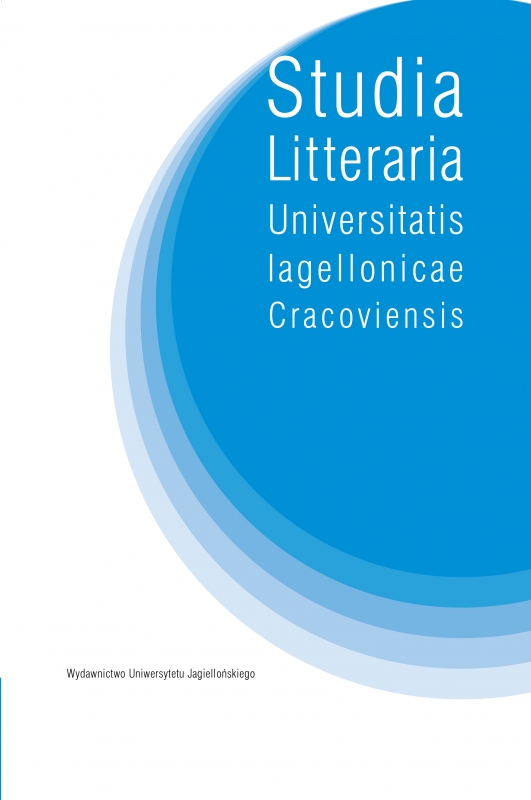
The paper presents an analysis of the construction of military masculinity in Carl Snoilsky’s Svenska bilder (Swedish Pictures). The construction of military masculinity is discussed as an important element of the cultural memory formulated in this Swedish canonical cycle of historical poetry. Taking Jan and Aleida Assman’s theory of cultural memory as a theoretical starting point, the article juxtaposes it with literary studies of masculinity to reflect on the meaning of military masculinity. War poetry and military poetry is identified as the dominant type of the poetic form of the cycle, and gendered patterns of cultural memory are discussed as reproducing the patriarchal principles of the nineteenth-century historiography. The dominant model of masculinity in Svenska bilder is presented as marked by militaristic values combined with the ethos of bourgeois masculinity. As the cycle assigns different military roles to the different stages of a man’s life, the dynamics of the meanings of masculinity is shown through the category of age. Chivalrous boyhood is presented as a stage preceding youth subordinated to the norm of homosocial military socialisation. The image of the adult man fighting at war is discussed as an amalgam of heroising and deheroising strategies. The presence of war veterans and the concept of the citizen-soldier in Svenska bilder is seen in the article as the confirmation of the hegemonic military model in the cycle.
More...
The article investigates the reception of Carl Snoilsky’s Svenska bilder (Swedish Pictures) in Swedish schools, from the 1890s until today, in the light of the concept of cultural memory. For more than half a century, Snoilsky’s cycle of poems, depicting important events and figures in Sweden’s early modern history, belonged to the literary school canon; three special school editions were published in 1894, 1931, and 1939 respectively, and frequently reprinted. In the 1960s, however, due to radical educational reforms, and the ensuing abandoning the idea of patriotic upbringing, the collection of historical poems lost its strong standing as a set reading, and it has since been more or less absent from the teaching of literature at school. It is concluded that the reception of Svenska bilder in the educational context reflects in several respects pronounced changes of Swedish cultural memory during the 20th century.
More...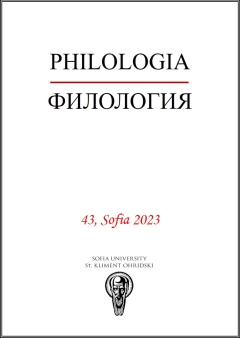
This article is based on the introduction to the Religion and Culture Seminar of the Center for the Study of Religions, Sofia University St. Kliment Ohridski. The seminar’s 2022–2023 interdisciplinary theme was “Center and Periphery in Religion and Society.” The text outlines the notion of center and periphery with the aim of framing a possible overall re-conceptualization, demonstrating why this notion remains highly relevant to our understanding of the intersection of religion and society. The analysis builds on preliminary notes on West Africa as an Islamic periphery to the Arab world. It then provides examples from the Middle East and Eastern Europe. The article argues that although a phenomenon looks peripheral from certain perspectives, this does not necessarily mean it is insignificant. In some cases, it might be more appropriate to speak of multiple interacting centers and peripheries rather than of one single center and a loose periphery.
More...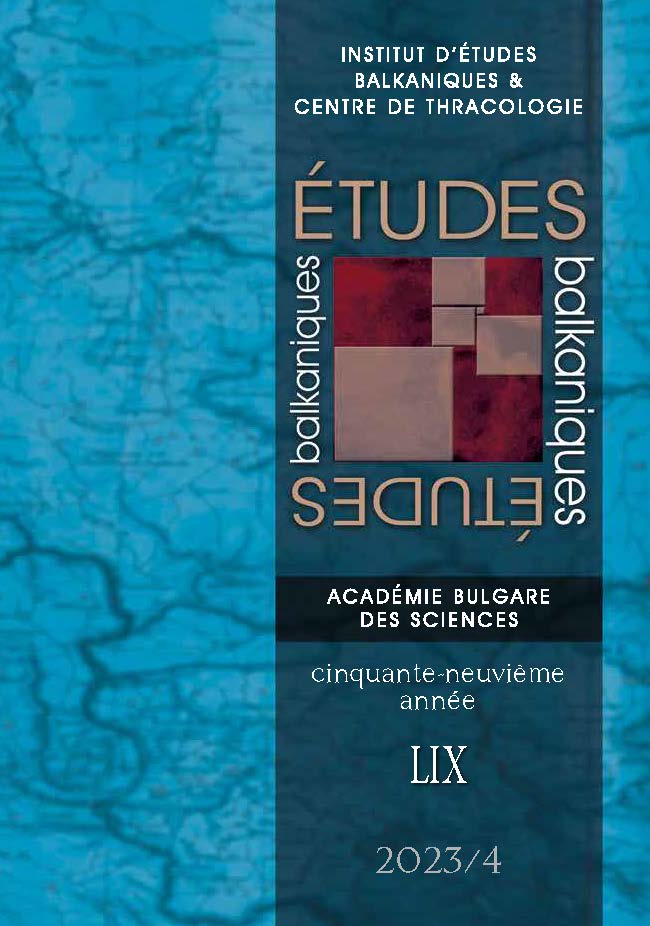
Founded in 1922 after an agreement between the French and Bulgarian governments, the French Institute in Sofia, opened the same year by the Minister of Public Instruction at the time, Mr. Omarcevski, introduced a new element of political support to the French culture and its institutions in Bulgaria compared to the first French Institutes, created at the beginning of the century. On the other hand, this Institute has established itself as the almost essential intermediary between the University of Sofia and the French universities at that time, with a significant contribution to the development of the Francophonie in Bulgaria, which brings it closer to its predecessors in Florence and Athens. The Sofia Institute has continued to develop. It is far from being a simple instrument for disseminating French culture in Bulgaria. In view of its organization and its historical operation, this institution seems to be, since 1937 and still today, a good example, in the spirit and according to the conception of perspective of the contemporary French Institute.
More...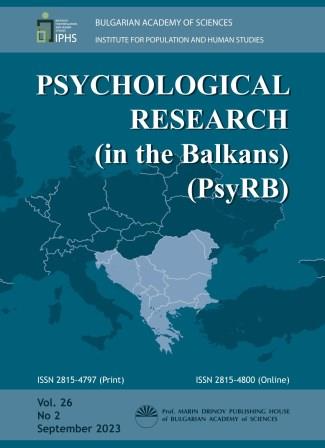
Socio-economic status and relationships between family members are factors that have an impact on adolescents‘ professional orientation. The report presents results from a study of vocational choice, relationship patterns as measured by the stroke economy, and the educational level of parents of adolescents from low socio-economic status families. The sample includes 195 adolescents, students in the seventh grade, and 109 of them indicate that they have made their vocational choice. According to the obtained results, the studied adolescents are oriented towards professions in the fields of health care and services. Leading stroke economy patterns are „Don‘t accept“ and „Don‘t give yourself“, which is expressed in a tendency to devalue one‘s own achievements and successes. It was also established that more than half of the parents of adolescents (60.47% of fathers and 69,77% of mothers) who have not made a vocational choice have basic (primary or lower secondary) education. The results testify to the role of parents‘ education as a factor that probably has an effect on the process of vocational guidance of adolescents. Significant differences in the stroke economy were found, as in adolescents who have made a vocational choice the „Don‘t ask“ style dominates, while in adolescents with a lack of vocational choice the „Don‘t give yourself“ style dominates. The results of the research can be used in the implementation of various educational and training programs for social inclusion, vocational guidance, and career development of adolescents from low socio-economic status families.
More...
This article presents a portion of the research data collected as part of the international applied research project “Communities for Sciences - Towards Promoting an Inclusive Approach in Science Education.” The project aims to promote inclusive science activities for children and youth in six different European locations. The findings of a project-based collaboration between researchers and kindergarten teachers of 3 groups of 3-4 years old Roma children from Faculteta neighborhood in Sofia are reported. The teachers work at 2 kindergartens situated in this location and run by the Health and Social Development Foundation (HESED). Participatory action research methodology was used to explore the opportunities for the three teams of teachers to apply more inclusive approaches in teaching science to children. Further, the article presents kindergarten teachers’ implicit knowledge and practices concerning child participation in the learning process. The teachers’ practices are discussed within the framework of a theory on levels of child participation. The article emphasizes the importance of creating an appreciative and supportive culture of relationships among teachers in the organization, which allows for an inclusive educational approach to be applied to their work with children. Additionally, the article discusses how broader educational and social contexts can either support or hinder teaching teams in applying their educational approach. The data collected should offer insights on how to develop more effective strategies for implementing inclusive science proposals that meet the specific needs of local communities. This can be achieved through co-creation and active citizen participation.
More...
This paper is the first to propose a comprehensive framework explaining the overall process of coping with life-threatening events. It encompasses: different types of such stressors (e.g. life-threatening illness/accident/assault, etc.), stressor appraisals (including challenge appraisal which is rarely considered in such studies), coping (using an instrument specially adapted for such context), as well as the interplay between these variables and its effect on mental health (measured through depression and life satisfaction). The community sample (N=153) completed: Coping Orientation of Problem Experience (COPE) with modified instruction (to recall a life-threatening event actually experienced), indicating also event`s nature and its appraisal; Severity Measure for Depression, Satisfaction with Life Scale, and socio-demographic survey. The data obtained suggested that the type of the life-threatening event is not related to differences in appraisal, coping, nor mental health outcome. It was also found that appraisals have a key role and special attention should be paid to challenge appraisal. The data suggested also that COPE with modified instruction is reliable instrument that captures the specifics of the life-threatening context. A four-factor structure was extracted: Problem-focused, Active emotional, Avoidant emotional copings, and Turning to religion, with the first and third factors being predictors of depression and life satisfaction, while second and fourth being related to depression or life satisfaction depending on the rest of the copings used. The framework proposed outlines the key elements in the process of coping with life threats and provides guidelines on how this data can be useful from theoretical and practical perspectives.
More...
International migration has been a significant trend in recent years. Digital transformation is regarded as a continuous process affecting virtually every area of life in societies worldwide. It has had a major impact on international migration, resulting in the emergence of a new era of interconnected migrants and digitalized migration processes. Digital transformation enables network building among migrants, making it possible to interact in a “digital space” from different geographic locations in real time. Also, through the use of digitalization, migrants can react to unexpected events such as socio-economic developments, natural disaster, climate change etc. by deciding to change the plan to migrate in terms of time and place. In this context, digital transformation has been defined as “the use of new digital technologies (social media, online information portals for migrants, job-search portals designed for migrant workers, governmental services in digital format)” to enable major migration improvements to enhance migrant workers’ experience or streamline the migration process. Taking inspiration from the new field of ICT and migration, this paper explores the migration process in Lithuania, and the role digital technologies has played to impact the ease of migration. It established a conceptual framework of digital transformation resources used by migrants during the migration process based on a literature review. Four main elements, located along two axes are included in the framework: the “host society-source society” and the “pre-migration phase-post-migration phase” axis. We conducted a survey and empirical assessment of survey results and concluded with some avenues for future research. Future work should increase the sample size for result validity.
More...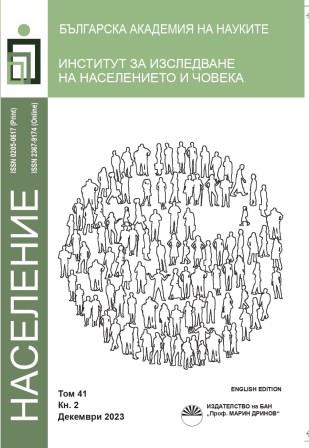
The article presents the results of a statistical analysis of the dependence of the birth rate in Bulgaria on the standard of living in an up-to-date aspect. Fertility was presented using the crude birth rate and the total fertility rate. In order to assess the standard of living, a complex set of criteria for administrative provinces was calculated, taking into account the state of 12 specially selected indicators at the same time. The information used was: the information officially published by the National Statistical Institute, Eurostat and data from the publication “Regional Profiles – Development Indicators” by the Institute for Market Economy. The algorithm of the used methodology was detailed, including the user options and arguments for choice. An international comparison was also made involving the EU Member States. The lack of a significant relationship between the birth rate and the standard of living according to complex criteria in Bulgaria and a moderate negative relationship between the total fertility rate and the standard of living in our country was revealed. When the analysis is based only on the GDP per capita as criteria for the achieved standard of living, the relationship between financial well-being and the birth rate turns out to be moderately positive, both for Bulgaria and for the entire set of EU Member States (EU 27). Recommendations were made for selective financial stimulation of the population in reproductive age and special attention to support married couples with reproductive problems and vulnerable social communities.
More...
The study analyses societal norms about voluntary childlessness in 29 European countries in the context of 1) achieved human development measured by its three main components: health, income and education and 2) some cultural norms towards inequalities and exclusion and the degree of individualism and collectivism in societies.The comparative analysis uses microdata from two waves of the European Social Survey, the third from 2006 and the ninth from 2018/2019, as well as aggregated data from Eurostat. The main statistical methods are descriptive and principal components analyses. Countries were classified according to their degree of modernisation. We registered unidirectionality across countries in the change of cultural norms relative to voluntary childlessness over time. We found convergences in the classification of countries according to attitudes towards voluntary childlessness and according to human development achieved and cultural differences, with human development leading the way. The study interprets the results in the context of traditional, modern and postmodern. The resultsof the study raise more fundamental theoretical questions related to the direction of change in cultural norms, such as what we can expect to happen in Central and Eastern European countries.
More...
Assessing the impact of the ongoing demographic processes on Bulgaria’s economy and social system requires a complex approach, since the in-depth analysis of the situation and the causes that lead to such demographic processes are a reliable basis on which to develop a concept for an active demographic policy. The purpose of this article is to reveal and measure the changes in the age structure of the population, to model the trends in the change of the age dependency ratio, and to evaluate the economic and social effects of population ageing, by using statistical methods of analysis. Statistical methods are used in the study to analyse dynamic series, to analyse structural changes and differences and to reveal relationships and dependencies. The results of evaluating the intensity of the changes in the age structure provide grounds for the conclusion that the changes in the age structure based on the three age groups – 0–14, 15–64 and 65+ compared to the base structure, are manifested more slowly in comparison with the changes in the structure of the population on the basis of consecutive cohorts formed by five-year age intervals. When compared with the structure of the previous year, the value of the ratios would turn out to be lower and would indicate weaker structural changes, since the age structure in the considered age intervals does not imply sharp changes within a year-long period. The developed trend models would make it possible to develop short-term forecasts of the expected values of the age dependency ratios by years with the corresponding confidence intervals of the forecast, evaluation of potential changes in the case of changes in the factors affecting the main demographic processes. The significant changes in the age structure of the population of Bulgaria and the deepening of the population ageing processes bring to the fore some important issues related to economic development, stability of the national economy, stability of the pension system and fiscal stability, due to the increased pension-related expenditures, expenditures on health care, social assistance, etc.
More...
The present study represents an attempt to identify basic effects of COVID-19 pandemic on the long-term trends observed in the labour force reproduction in Bulgaria. The period of time of the study selected (2006-2021) starts with the year before the Bulgaria’s accession into the EU. To receive a more objective assessment of the changes studied, an international comparison of the trends was made with four European countries: Greece, Hungary, the Czech Republic and Sweden. Statistical information published by the National Statistical Institute and Eurostat (vital statistics and annual data of Labour Force Survey) over the period analysed was used in the study. The study includes two aspects of analysis. The first aspect covers the examination of longterm trends of evolution of basic demographic parameters in the selected countries (labour force dimension and speed of the demographic ageing). The second aspect is focussed on the trends of evolution of economic activity levels by three demographic and social attributes (age, sex and level of education). The results obtained provide a basis to consider the negative changes in the longterm trends observed during the period 2020–2021 as an indication for the presence of COVID-19 pandemic’s different sized effects on the labour supply.
More...
This paper aims to discuss the role of intrapreneurship for supporting sustainable development in organisations and achieving environmental, social and business sustainability. The results of a survey conducted in Bulgaria among employees and employers are presented and an analysis of the effect their intrapreneurial skills and attitudes have on the existing practices, targeted towards achieving sustainable development in organisations, was made. The results of the study confirm the thesis defended in the paper, related to the understanding that building capacity within existing organisations to identify innovative ideas and further develop them in intrapreneurial endeavours for the modification of products, services and organisational processes has a significant potential for positive impact on sustainability.
More...
A stable social group is being formed in the Bulgarian society, and this group has no chances to self-fulfil on the labour market due to illiteracy or lack of education and/or qualifications. At the same time, changes in the labour market impose higher requirements on labour force’s educational and qualification levels. Thirdly, the social stratification of society results in linking access to education with the socio-economic status of families. The question arises whether it is possible for the scarcity of economic and cultural capital to be influenced by the social capital’s resources for the purposes of education? Under what circumstances social capital could increase or decrease the likelihood of educational achievements of students in the Bulgarian education system? This work examines the problem of the relationship between social capital and educational achievements through the lens of theories of James Coleman, Pierre Bourdieu, Alejandro Portes and Nan Lin and Raymond Boudon’s theory of primary and secondary effects of social origins, as further developed by Robert Erickson, Jan Jonsson, John Goldthorpe and Hartmut Esser.
More...